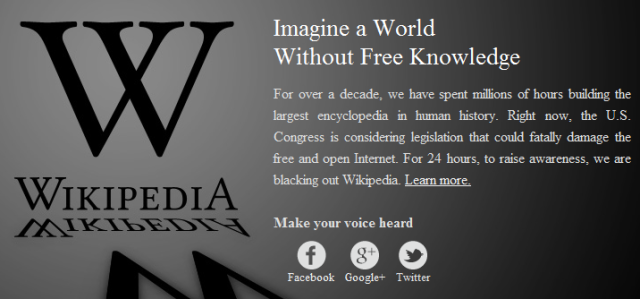
United States politicians have, for the moment, succumbed to pressure of a growing campaign against the Stop Online Piracy Act (SIPA) and the PROTECT IP act (PIPA).
The campaign has involved forces ranging from independent bloggers and content producers to internet giants Wikipedia, Reddit, Facebook, Twitter and Google
In response to protests, the proposed acts have, for now, been shelved.
SOPA (in the US House of Representatives bill) and PIPA (in the US Senate) are proposed US laws. However, they have global implications, as actions can be taken against any site whose server is in the US or which violates a US law.
The acts are presented as a means to stop online piracy (dissemination of copyrighted material without the copyright owner's permission). However, they are highly flawed acts that will not effectively combat piracy but will hurt independent producers and strangle freedom of speech.
Many opponents of these acts believe that is what they are really being introduced to do.
The proposed SOPA act is meant to work in a couple of ways. First, it grants judges the ability to force internet service providers to block access to websites on grounds that they support piracy.
Second, it allows for charges to be laid against offending websites. Actions against websites can include accounts frozen, sites sued, sites taken down and even five years in jail for those involved.
The bills are mainly being supported by the likes of the Motion Picture Association of America, the Recording Industry Association of America and the US chamber of commerce.
These groups have raised concerns about online piracy causing them to lose revenue — most never reaches the artists who produce the works in the first place.
There are already many laws that these large corporations can access. These include being able to get content subject to copyright removed from a website and the ability to sue people for piracy.
Under such laws, families can be sued over the music playing in the background of a home movie.
SOPA will not stop piracy. There are myriad ways to circumvent it. Some common strategies include using alternative servers, proxy services and other domain names. More are likely to be invented.
Even Pirate Bay, one of the largest piracy websites in the world, has said it isn’t concerned about the legislation affecting it from a business standpoint. However, it raised concerns over the potential of the acts to restrict free speech.
Many independent content producers, such as musicians, filmmakers and bloggers, have heavily criticised the bill. Fight for the Future, a non-profit group, has a specific letter for artists to sign alongside their broad one, highlighting the significance threat this bill poses.
The broad interpretation of the bill means it can be used to target any site that links to another site with pirated content or tutorials on piracy. This could be as simple as instructions on how to burn a CD.
It means that any site, big or small, that posts links to copyrighted material, or has users which do, can be shut down and have accounts frozen. The implication for social networking sites such as Facebook or Twitter — which revolve around users posting such links — could be dire.
But it also has the potential to destroy any individual blog or small site.
Many independent artists could be shut down under the law, further centralising even more control into the hands of the major studios and record companies pushing the bill.
By granting the US government wide-ranging powers to shut down sites, the acts threaten to give it powerful tools to politically censor the net.

On January 18, Wikipedia led what has been dubbed an internet strike against the acts. Wikipedia, and other sites such as Reddit, “blacked out” their sites, shutting down in protest.
With an easy to use code and plugins created and promoted by opponents of the acts, many small sites and individual bloggers took part in the online protest. This raised a huge amount of awareness and many people upon knowing the consequences of SOPA rallied against it.
Reddit and other groups have also been encouraging boycotts of companies that support it. There is a plugin developed to tell people when they are on a website that supports SOPA, giving the use a chance to boycott it.
The most important element in the campaign against online censorship is the many bloggers, internet users and activists on the ground.
The campaign against SOPA has shown off a variety of methods of internet activism — various ways of spreading information, going on strike and boycotting companies.
These strategies, while being effective in the short term, will not by themselves stop censorship in the long run.
To seriously stop internet censorship, must be a continuation of the growing campaign by the masses on the streets against attacks on civil liberties.
The recent victory against SOPA and PIPA are reason to celebrate. However, it is not time to become complacent.
Soon after their defeat, police raided Megaupload — a popular file sharing site. This forced many filesharing sites to go down. Already other bills aimed at controlling the internet are being proposed in the name of stopping porn among other things.
For all the bills’ rhetoric of stopping things like porn and piracy, it wouldn’t be long before they are used against political activism.
As attacks ramp up against the internet, it is essential for activists to fight against an attack on an increasingly valuable tool for mobilising people on the streets.
Comments
Anonymous replied on Permalink
Anonymous replied on Permalink